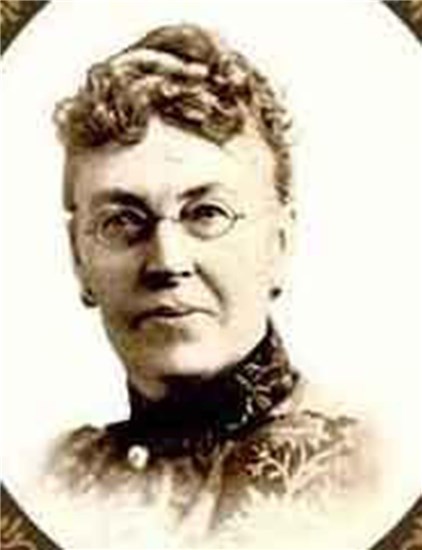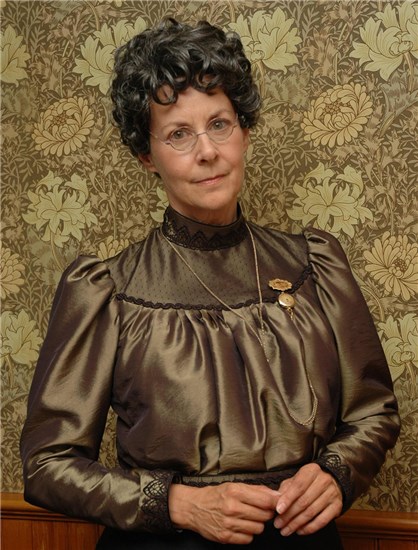

Augusta Tabor (1833-1895)
by Mary Jane Bradbury
“Ho! For Pike’s Peak! Gold in Great Abundance!” The call was sounded in the East in 1858, and by spring of 1859 the Rush to the Rockies had begun in earnest. Kansas farmer and stonecutter Horace A. W. Tabor, his young wife Augusta, and their toddler son Maxcy, having endured two lean years of homesteading on the bloody prairies of pre-Civil War Kansas territory, put their earthly belongings in a wagon and joined the gold rush, destined for fame in the annals of the Colorado mining frontier.
While Horace pursued his dream of easy riches, Augusta persisted, even thrived, in the chaotic and filthy conditions of the mining camps, running boarding houses, managing dry goods stores and post offices to sustain her family. She lived in wagons (and under them), in cabins, above stores and behind them, using her ability to successfully negotiate the fickle nature of boom and bust frontier economics, supporting her husband and raising their son. Often called the First Lady of Leadville, Augusta earned the respect and admiration of her fellow pioneers and was known for her generosity and kindness, her practicality and determination, and her philanthropy.
In 1878, the family moved into a modest home in Leadville. She was content, believing they had found the success they sought: profitable businesses amid the growing silver boom, a comfortable home and the respect of their neighbors. That same year, Horace struck the first of several rich silver mines and wealth brought unexpected change. In 1879, the Tabors moved to a 21-room mansion in Denver. Silver Baron H. A. W. Tabor soon took his place as one of the richest men in Colorado, and Augusta was placed center stage in one of the most highly publicized scandals of the Victorian age.
From her native Maine to Kansas prairies to Colorado mining camps, Augusta had supported and believed in her husband. She had given him the stability and devotion to accomplish his dream. She held her head up when rumors of infidelity began, when Horace’s political and business decisions made him look foolish, and when he divorced her for a younger woman. Augusta simply did not believe in the excess and imprudence that unfathomable wealth brought to their lives, so he found someone who did. Her warnings that the “Tabor luck” would not last forever fell on deaf ears. While scandal swirled around them in the early 1880s, Augusta never lost faith in her marriage or the husband she believed would one day return to her. He never did.
As was the law for divorcing couples in 19th century America, the wife was entitled to exactly nothing. Augusta received her home and a small monthly income from one of Tabor’s investments. In the years following the divorce, as economic reversals and the devaluing of silver eroded Horace Tabor’s fortune and finally brought it to ruin, Augusta’s astute investments created an estate worth more than a million and a half dollars. She died in Pasadena, California at the age of 62, leaving us an accurate account of a woman’s life on the frontier, showing us the strengths and strategies needed to survive in a hostile environment and improve it.
Recommended Reading
Moynihan, Betty, Augusta Tabor: A Pioneering Woman. Cordillera Press, 1988.
Smith, Duane, Horace Tabor: His Life and Legend. Colorado Associate University Press, 1973.
Nolte, Judy, Baby Doe Tabor: The Mad Woman in the Cabin. University of Oklahoma Press, 2009.
West, Elliot, These Contested Plains: Indians, Goldseekers and the Rush to Colorado. University Press of Kansas. 1998.
Mary Jane Bradbury
Mary Jane Bradbury has 25 years experience as an educator and actress, and has been portraying historic women for 12 years. She is a Chautauqua speaker for Humanities Montana and the Colorado Humanities, and an enactor for the Denver Museum of Nature and Science, having worked with temporary exhibits Ben Franklin: In Search of a Better World; Titanic: The Artifact Exhibit; and A Day in Pompeii, for which she designed costuming. Ms. Bradbury helped develop the museum’s current enactment program, interpreting historic aspects of natural history and modern science for permanent exhibits and educational programs, and has developed interpretive programs for museums throughout the Rocky Mountain West. Ms. Bradbury has a MA in Speech Communication from Regis University.
Bullet Points
-
After homesteading in Kansas for two years, Augusta experienced the trials and challenges of the eight-week journey across the prairie to the gold camps.
-
As one of the first women in the camps, Augusta kept her family and prevailed through resourcefulness and an indomitable spirit that characterized success on the frontier. She was called the First Lady of Leadville for her generosity and kindness.
-
When the fortunes of the mining game smiled on her family, Augusta retained her grace and endured one of the era’s infamous scandals, that of Silver Baron Horace Tabor and Baby Doe.
Quotes
-
“The name’s Tabor. This is the way I make money to help my husband. He’s bent on prospecting and one of these days he’ll make that big find. His luck will turn, just see if it won’t. Till then I’m willing to do my part.”
-
Mrs. Elizabeth Entriken, reminiscence of meeting Augusta at a wayside stop as Augusta was setting up to do laundry for travelers, near Bailey, Colorado, 1865
-
“There is no doubt that much of Tabor’s success was due to her [Augusta’s] courage and strength of purpose.”
-
Chicago Tribune, January 23, 1898
-
“Augusta was an angel of mercy whose infinite kindness of heart and acts of benevolence were legion.”
-
Nathan Hurd, pioneer, interviewed 1921
-
“Few women were more thrifty or industrious. Not many men had more courage, common sense, or initiative, especially in a crisis. [Augusta] had great strength and remarkable endurance. She was a full-fledged partner, and often carried more than her share of the mutual load.”
-
Morning Chronicle, Manhattan, Kansas, undated
-
“Mrs. Tabor was the principal in many acts of charity, but she seldom talked upon the subject to her friends and the world will never know the extent to which she distributed her wealth for the alleviation of distress. As a pioneer woman she performed her part in paving the way for the advantages which are presented today. No other woman of Colorado has developed the financial ability which marked the course of Mrs. Tabor … With her departure passes from the stage an historical character of the state.”
-
Denver Post death notice, January, 1895
Timeline
1833 Augusta Louisa Pierce born March 29, in Augusta, Maine
1854 Horace Tabor comes to work at the Pierce’s stone quarry – meets Augusta
1857 Horace and Augusta marry in Maine in January – leave for Kansas homestead in February; son Maxcy born in October
1859 Tabors join the Rush to the Rockies in May, arrive in Denver City mid-June
1860 Tabors arrive in California Gulch, the location of what would later be Oro City, later Leadville, CO
1876 Colorado becomes the 38th state in the Union
1877 Silver production in paying quantities begins in Leadville; Horace appointed first mayor
1878 Horace hits pay dirt with the Little Pittsburgh mine; within a year it’s paying nearly $8,000 a day in ore; Horace is elected Lieutenant Governor with Governor Pitkin
1879 Tabors move to Denver mansion. In 1878 or 79, Horace meets Elizabeth McCourt “Baby” Doe
1880 Horace Tabor leaves Augusta to live with Baby Doe
1883 Horace and Augusta Tabor divorce amid scandal; Horace runs for U.S. Senate and fails
1893 The federal Sherman Silver Purchase Act is repealed in August; Horace Tabor’s already waning fortune begins catastrophic descent
1895 Augusta Pierce Tabor dies January 30 in Pasadena, California.